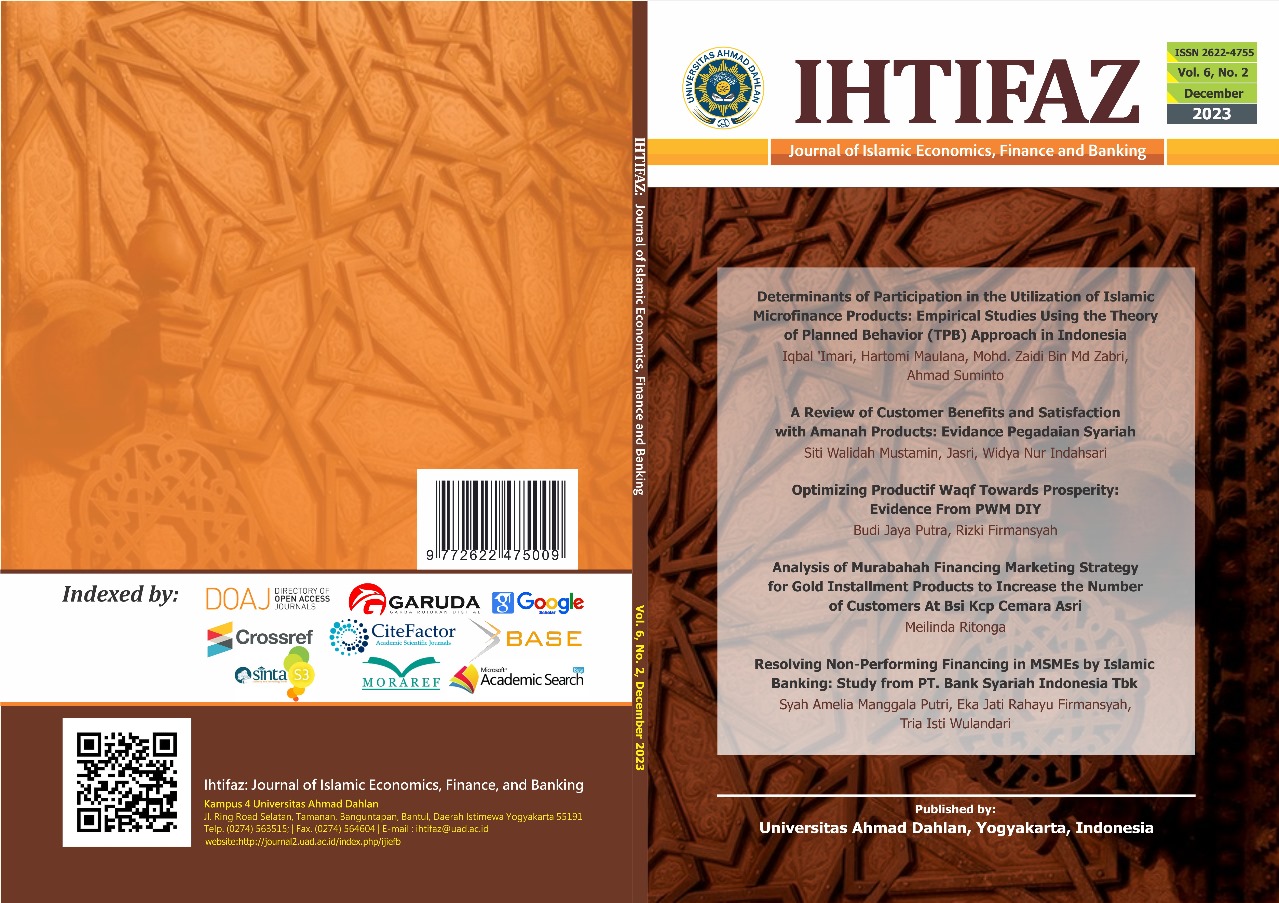Resolving Non-Performing Financing in MSMEs by Islamic Banking: Study from PT. Bank Syariah Indonesia Tbk
DOI:
https://doi.org/10.12928/ijiefb.v6i2.10533Keywords:
MSME, Islamic Bank, Restructuring, Non-Performing Financing, PT. Bank Syariah Indonesia Tbk.Abstract
Abstract
Introduction to The Problem: MSMEs have proven resilient to various crises and significantly contribute to the national economy. The primary support is financing for both investment and working capital. However, MSME financing is seen as having a high risk by banks, which is feared will result in losses. Islamic banks must have an exit strategy in dealing with NPF so that the distribution of MSME financing can grow healthily and sustainably.
Purpose/Objective Study: The paper aims to analyze how Islamic banks resolve non-performing financing disbursed to MSMEs.
Design/Methodology/Approach: We used a qualitative method with a field research approach. The research was a case study examining primary data collected through observation, interviews, and documentation. The validation test used a triangulation method by comparing the interview results and the research subjects.
Findings: Islamic banks resolved non-performing financing in MSMEs through non-performing financing warning, rescuing, and resolving. They conferred warnings by billing to collect customers’’ funds serving as payment for overdue liabilities. As regards rescuing non-performing financing, rescheduling, reconditioning, and restructuring were conducted. Finally, they resolved non-performing financing through novation, compensation, collateral liquidation, and court settlement
Paper Type: Research Article
References
Ahmad, S., Lensink, R., Mueller, A., 2020. The double bottom line of microfinance: A global comparison between conventional and Islamic microfinance. World Development 136, 105130. https://doi.org/10.1016/j.worlddev.2020.105130
Alandejani, M., Asutay, M., 2017. Non-performing loans in the GCC banking sectors: Does the Islamic finance matter? Research in International Business and Finance 42, 832–854. https://doi.org/10.1016/j.ribaf.2017.07.020
Alkhan, A.M., Hassan, M.K., 2021. Does Islamic microfinance serve maqāsid al-shari’a? Borsa Istanbul Review 21, 57–68. https://doi.org/10.1016/j.bir.2020.07.002
Arikunto, S., 1998. Prosedur Penelitian Suatu Pendekatan Praktek. PT. Rineka CIpta, Jakarta.
Bank Indonesia, 2022a. Peraturan Bank Indonesia No. 10/18/PBI/2008 tentang Restrukturisasi Pembiayaan bagi Bank Syariah dan Unit Usaha Syariah [WWW Document]. URL https://peraturan.bpk.go.id/Home/Details/137601/peraturan-bi-no-1018pbi2008 (accessed 4.21.22).
Bank Indonesia, 2022b. Surat Edaran Bank Indonesia Nomor 10/35/DPbS tentang Restrukturisasi Pembiayaan bagi Bank Umum Syariah dan Unit Usaha Syariah [WWW Document]. URL https://www.ojk.go.id/id/kanal/syariah/regulasi/peraturan-perbankan-syariah-pbi-dan-sebi/Pages/surat-edaran-bank-indonesia-nomor-10-35-dpbs-3.aspx (accessed 4.21.22).
Bank Indonesia, 2021. Peraturan Bank Indonesia Nomor 23/13/PBI/2021 tentang Rasio Pembiayaan Inklusif Makroprudensial bagi Bank Umum Konvensional, Bank Umum Syariah, dan Unit Usaha Syariah [WWW Document]. URL https://www.bi.go.id/id/publikasi/peraturan/Pages/PBI_231321.aspx (accessed 11.27.21).
Bank Syariah Indonesia, 2021. 9M 2021 Results PT Bank Syariah Indonesia Tbk.
Bapeda DIY, 2021a. Data Dasar UMKM [WWW Document]. URL http://bappeda.jogjaprov.go.id/dataku/data_dasar/index/107-ukm (accessed 11.27.21).
Bapeda DIY, 2021b. List Data Dasar Kredit UMKM Perbankan ( Bank Umum dan BPR ) [WWW Document]. URL http://bappeda.jogjaprov.go.id/dataku/data_dasar/index/431-kredit-umkm-perbankan-bank-umum-dan-bpr (accessed 11.27.21).
Cameron, A., Oak, M., Shan, Y., 2021. Peer monitoring and Islamic microfinance. Journal of Economic Behavior & Organization 184, 337–358. https://doi.org/10.1016/j.jebo.2021.02.001
Fan, Y., John, K., Liu, F.H., Tamanni, L., 2019. Security design, incentives, and Islamic microfinance: Cross country evidence. Journal of International Financial Markets, Institutions and Money 62, 264–280. https://doi.org/10.1016/j.intfin.2019.08.002
Fauziah, N.D., 2018. Restrukturisasi Sebagai Salah Satu Upaya Penyelesaian Pembiayaan Bermasalah Di Bank Syariah. adlh 3, 168–178. https://doi.org/10.31538/adlh.v3i3.407
Fianto, B.A., Gan, C., Hu, B., Roudaki, J., 2018. Equity financing and debt-based financing: Evidence from Islamic microfinance institutions in Indonesia. Pacific-Basin Finance Journal, Islamic Banking and Finance IV 52, 163–172. https://doi.org/10.1016/j.pacfin.2017.09.010
Fianto, B.A., Maulida, H., Laila, N., 2019. Determining factors of non-performing financing in Islamic microfinance institutions. Heliyon 5, e02301. https://doi.org/10.1016/j.heliyon.2019.e02301
İncekara, A., Çetinkaya, H., 2019. Credit Risk Management: A Panel Data Analysis on The Islamic Banks in Turkey. Procedia Computer Science, 3rd WORLD CONFERENCE ON TECHNOLOGY, INNOVATION AND ENTREPRENEURSHIP “INDUSTRY 4.0 FOCUSED INNOVATION, TECHNOLOGY, ENTREPRENEURSHIP AND MANUFACTURE” June 21-23, 2019 158, 947–954. https://doi.org/10.1016/j.procs.2019.09.135
Kemenko Perekonomian RI, 2021. UMKM Menjadi Pilar Penting dalam Perekonomian Indonesia - Kementerian Koordinator Bidang Perekonomian Republik Indonesia [WWW Document]. Kementrian Koordinator Bidang Perekonomian Republik Indonesia. URL https://ekon.go.id/publikasi/detail/2969/umkm-menjadi-pilar-penting-dalam-perekonomian-indonesia (accessed 11.27.21).
Kuncoro, H., 2021. Kredit UMKM. Republika.
Liputan6.com, 2020. Berapa Jumlah UMKM di Indonesia? Ini Hitungannya [WWW Document]. liputan6.com. URL https://www.liputan6.com/bisnis/read/4346352/berapa-jumlah-umkm-di-indonesia-ini-hitungannya (accessed 11.27.21).
Mediatama, G., 2021. Siap-siap, Bank Syariah Indonesia (BSI) masih akan tutup puluhan kantor tahun 2022 [WWW Document]. kontan.co.id. URL https://keuangan.kontan.co.id/news/siap-siap-bank-syariah-indonesia-bsi-masih-akan-tutup-puluhan-kantor-tahun-2022 (accessed 11.27.21).
Moeloeng, L.J., 2000. Metodologi Penelitan Kualitatif. PT. REmaja Rosda Karya, Bandung.
Nasution, S., 2006. Metode Research (Penelitian Ilmiah). Bumi Aksara, Jakarta.
Otoritas Jasa Keuangan, 2021. Siaran Pers: Sektor Jasa Keuangan Stabil dan Tumbuh Positif, Perbankan Kucurkan Kredit Rp1.439 Triliun Sampai Juli 2021 [WWW Document]. ojk.go.id. URL https://www.ojk.go.id/id/berita-dan-kegiatan/siaran-pers/Pages/Siaran-Pers-Sektor-Jasa-Keuangan-Stabil-dan-Tumbuh-Positif.-Perbankan-Kucurkan-Kredit-Rp1.439-Triliun-Sampai-Juli-2021.aspx (accessed 11.27.21).
Pemda DIY, 2021. Pemulihan Ekonomi Harus Diawali dari UMKM - Berita | Portal Pemda DIY [WWW Document]. URL https://jogjaprov.go.id/berita/detail/9308-pemulihan-ekonomi-harus-diawali-dari-umkm (accessed 11.27.21).
Republika, 2021a. Penyaluran Kredit Perbankan ke UMKM Capai Rp 1.150 Triliun [WWW Document]. Republika Online. URL https://republika.co.id/share/qwsw4g423 (accessed 11.27.21).
Republika, 2021b. Dirut BSI: Kita Komit untuk Mendukung UMKM [WWW Document]. Republika Online. URL https://republika.co.id/share/qtntpm423 (accessed 11.27.21).
Sugiono, 2010. Metode Penelitian Kuantitatif, Kualitatif dan R&D. Alfabeta, Bandung.
Wasiaturrahma, Ajija, S.R., Sukmana, R., Sari, T.N., Hudaifah, A., 2020. Breadth and depth outreach of Islamic cooperatives: do size, non-performing finance, and grant matter? Heliyon 6, e04472. https://doi.org/10.1016/j.heliyon.2020.e04472
Downloads
Published
Issue
Section
License
Copyright (c) 2023 Universitas Ahmad Dahlan

This work is licensed under a Creative Commons Attribution-NonCommercial-ShareAlike 4.0 International License.
License and Copyright Agreement
In submitting the manuscript to the journal, the authors certify that:
- They are authorized by their co-authors to enter into these arrangements.
- The work described has not been formally published before, except in the form of an abstract or as part of a published lecture, review, thesis, or overlay journal. Please also carefully read Ihtifaz, Journal of Islamic Economics, Finance, and Banking Posting Your Article Policy at http://journal2.uad.ac.id/index.php/ijiefb/about/submissions#onlineSubmissions
- That it is not under consideration for publication elsewhere,
- That its publication has been approved by all the author(s) and by the responsible authorities “tacitly or explicitly“ of the institutes where the work has been carried out.
- They secure the right to reproduce any material that has already been published or copyrighted elsewhere.
- They agree to the following license and copyright agreement.
Copyright
Authors who publish with Ihtifaz, Journal of Islamic Economics, Finance, and Banking agree to the following terms:
- Authors retain copyright and grant the journal right of first publication with the work simultaneously licensed under a Creative Commons Attribution License (CC BY-SA 4.0) that allows others to share the work with an acknowledgment of the work's authorship and initial publication in this journal.
- Authors are able to enter into separate, additional contractual arrangements for the non-exclusive distribution of the journal's published version of the work (e.g., post it to an institutional repository or publish it in a book), with an acknowledgment of its initial publication in this journal.
- Authors are permitted and encouraged to post their work online (e.g., in institutional repositories or on their website) prior to and during the submission process, as it can lead to productive exchanges, as well as earlier and greater citation of published work.

_1.png)


